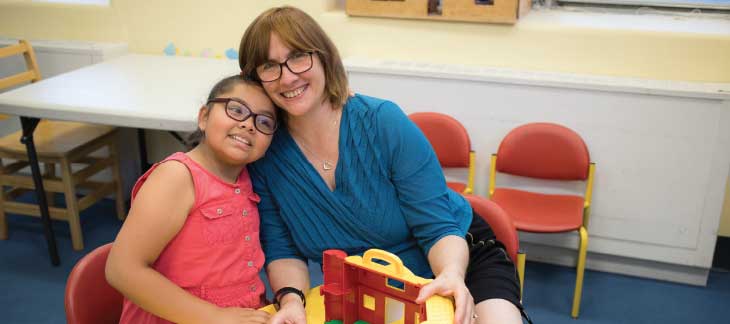 Lisa Shulman, M.D., with a student.
Lisa Shulman, M.D., with a student.
According to a new study from researchers at Einstein and Montefiore—the largest of its kind, with the most rigorous diagnostic follow-up—the answer to whether children can age out of autism is a qualified “yes.”
A small minority of children with an initial diagnosis of autism spectrum disorder (ASD) no longer qualify for it later on, yet most of them still have difficulties that require therapeutic and educational support.
“It’s certainly encouraging to confirm that a subset of children with early ASD diagnosis can in essence recover from the disorder and go on to have typical social and cognitive functioning,” says lead author Lisa Shulman, M.D., who is a professor of pediatrics at Einstein and interim director of the Rose F. Kennedy Children’s Evaluation and Rehabilitation Center at Montefiore. “But by and large, these children continue to struggle with daily life. Almost all of them still contend with language and learning disabilities and a variety of emotional and behavioral problems.”
In the study, Dr. Shulman and her colleagues reviewed the clinical records of 569 young children who were diagnosed with ASD. Most had received early-intervention services. When followed up an average of four years after their initial diagnoses, 38 children—7% of the group—no longer met the diagnostic criteria for ASD. Of those 38, two-thirds still exhibited language or learning disabilities; half had externalizing behavior problems, such as attention-deficit/hyperactivity disorder, and a quarter had internalizing behavior problems, such as anxiety disorder. Only three of the 38 children who recovered from ASD had no other problems, the authors reported in 2019 in the Journal of Child Neurology.
What is going on with these children who no longer have an ASD diagnosis? “Our sense is that some children with ASD respond to intervention and others have unique developmental trajectories that lead to improvement. Those children who evolve in a positive direction generally have the mildest symptoms to begin with,” Dr. Shulman says. “The message from our study,” she adds, “is that some of our kids do amazingly well, but most of them have persistent difficulties requiring ongoing monitoring and therapeutic support.”